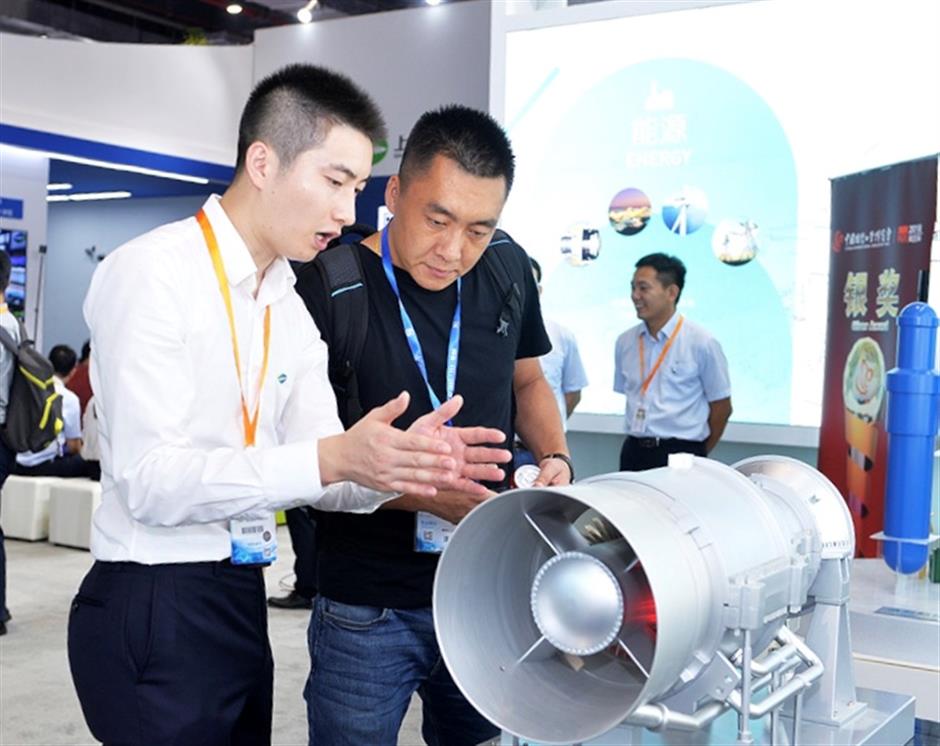Traditional industries explore tomorrow

the CIIF award-winning product of Shanghai Electric attracts visitors.
Industry shapes our lives, directly or indirectly, and a recent international fair in Shanghai provided some insights into what shape that may take.
The 21st China International Industrial Fair, which closed on September 21, pointed to a future where robots take over drudge work like trash sorting, medical devices provide better diagnoses and digital science improves the efficiency and scope of companies that produce consumer goods.
The fair, which featured 2,610 exhibitors, was designed to promote industrial exchanges between China and the rest of the world and also to highlight Shanghai’s important role in the global supply chain. Indeed, Shanghai companies comprised almost a quarter of exhibitors.
The fair spanned the whole of the manufacturing chain, from raw materials to advanced manufacturing equipment. It underscored the rapid integration of manufacturing technology and the new generation of technologies such as big data, cloud computing, artificial intelligence and 5G telecommunications.
Some 182,000 visitors from home and abroad came to glimpse the future.
The fair was specifically designed to be “forward looking,” according to organizers.
A large number of Chinese new products and technologies were displayed, some for the first time, at the fair.
One of the 10 awards handed out during the event went to Shanghai United Imaging Healthcare’s new CT scan machine. Last December, the Cat scanner received approval from the US Federal Food and Drug Administration for export to the US.
Foreign exhibitors displayed their latest innovations and sought partnerships to bring their wares and ideas to the China market.
It wasn’t only products at the heart of industrial transformation, but also models of management, research and development, and brand promotion. The accent was on innovative approaches.
The fair hosted 13 forums where professionals could come together to share ideas and discuss new horizons.
Ten industry fair awards were announced, singling out companies, products and ideas that are leading the way forward. All winners bar one were Chinese companies. The exception was Yamazaki Mazak (China), a joint venture.
The award honored products that are “world firsts” or have attained global advanced levels. Such progress is part of the “made in China” campaigned aimed at breaking the monopolies foreign companies have held in the nation.
China’s consumer market, according to fair organizers, is a driver of industrial development as companies strive to meet the ever-changing demands of that market.
One example is Kuka, a German manufacturer of factory robots. The company is owned by China’s Midea Group.
Kuka exhibited its flexible robots for the automotive industry, one of the three big markets for robots. The company said the robots will improve automotive products and services to make them more personalized and flexible to address consumer needs.
Swiss-based multinational ABB, showcased its logistics robots at the fair. One of them, its waste-separation prototype, uses an artificial intelligence network of robots, computers and sensors to classify trash into four separate categories.
The prototype is seen as a boon in helping residents adhere to Shanghai’s stringent new garbage-sorting rules.
Li Gang, head of ABB's China Robotics Business Unit, said the company is focused on automation in the automotive, computer, communications and consumer electronics industries.
He said automation in the logistics field is still relatively low. If robots can be combined with artificial intelligence and inspection technologies, broad new horizons will open in the logistics field.
In the field of 5G technology, Shanghai-based SAIC Motor Corp exhibited a “smart” heavy truck. The unmanned vehicles will be used initially in moving containers in ports like Yangshan.
China Mobile displayed its latest technologies linking 5G technology with manufacturing machinery. One displayed linkage with the tobacco industry.
















